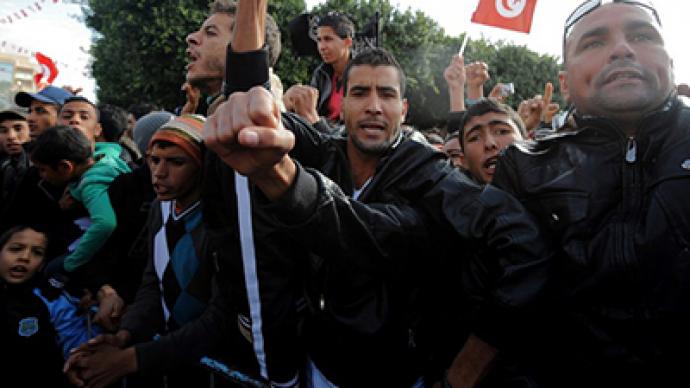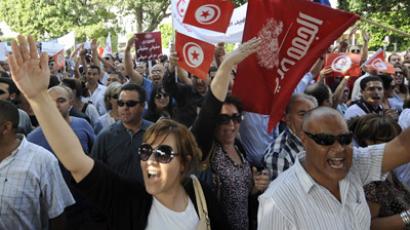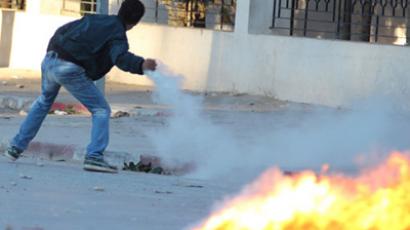Tunisia in turmoil: Stones thrown at president, unrest 2 years after Arab Spring

Tunisian protesters in Sidi Bouzid, the epicenter of the country's Arab Spring uprising, threw rocks at visiting President Moncef Marzouki and other top leaders in a show of protest. Two years after the revolution, Tunisia is still gripped by unrest.
In late 2010, a 26-year-old university graduate lit himself on fire in Sidi Bouzid. Protests broke out across Tunisia on December 17, 2010, and were then repeated across North Africa and the Middle East. Tunisian President Zine el Abidine Ben Ali was the first ruler to be ousted in the Arab Spring uprisings, following months of violent unrest.
One week ago – nearly two years after Ben Ali was deposed by the popular uprising – tens of thousands of protesters turned out in a mass strike planned by the country’s most powerful labor union, aimed at the stagnant economy and police brutality.
Two weeks earlier, another protest saw over 200 people wounded in clashes between Tunisian security forces and thousands of protesters in the impoverished town of Siliana. Fighting there raged on for several days, according to local medics.
The unrest comes during a period of record unemployment in Tunisia. In November, the World Bank approved a $500 million loan to alleviate the country’s economic woes; another $700 million came from other donors. It was the second loan approved by the World Bank since the Arab Spring swept Ben Ali from power.
Most activists say that the Arab Spring brought about the exact opposite of what the demonstrators intended.
“The situation is worse right now in comparison to years before the revolution. Personally, I don’t feel safe anymore. When you see all the violence of the police of the salafis. Even the police are attacked sometimes. And there’s less freedom. I received so many messages from girls who say they were harassed on the street, even by police, who didn’t tolerate the way they dress,” Tunis-based activist and blogger Lina Ben Mhenni told RT.The turmoil in Tunisia mirrors similar structures across the region. Experts say that the policies the newly elected leaders enact are not far from those of their predecessors.In Egypt, opposition groups are urging a mass protest on Tuesday over alleged vote rigging during the national referendum on a controversial draft of the constitution. On Sunday, the Muslim Brotherhood announced the first results, prompting anger and accusations of electoral fraud. The next vote in the referendum is scheduled for the coming weekend.“Those who voted for the Muslim brotherhood in Egypt did so because they wanted economic changes, not just getting rid of Mubarak and letting Morsi in. And Morsi, even though he’s obviously a very different political figure to Mubarak in terms of his ideology, has carried on much the same policies in terms of economic policy,” journalist and broadcaster Neil Clark told RT.“I think it has to be a different type of a democratic system. The democracy that the US would like to impose upon Egypt, Tunisia, Morocco and other countries throughout the region, even Libya, where war was waged last year to topple the Qaddafi government, is not suitable to the people inside of that region,” Detroit's Pan-African News Wire editor Abayomi Azikiwe said to RT.














